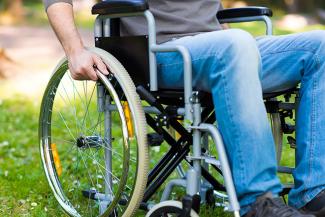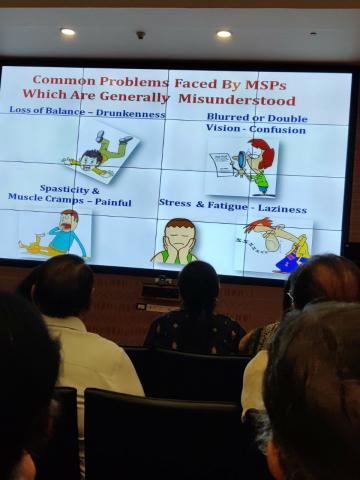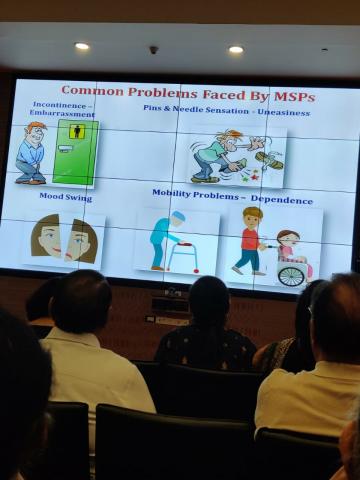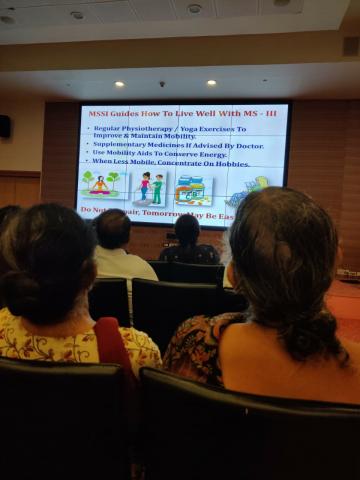
Today, with excellent diagnosis and medicines, Multiple Sclerosis patients can lead an almost normal life, was the message upheld by all participating neurologists and MSSI at a recent medical seminar.
There was optimism that rang through at the Multiple Sclerosis medical seminar held at the Kokilaben Dhirubhai Ambani Hospital recently. All the speakers emphasised on how there has been a paradigm shift for the better in diagnosis, treatment and overall management of multiple sclerosis (MS) in the last three decades. Now, with early detection and medication, a patient can lead a near normal life.
Inaugurating the session, Dr. Mohit Bhatt, Director- Neurosciences & Movement Disorder Specialist, said that there was a time when MS was an uncommon disease and its complications and disorders were often mistaken for other illnesses. “But in the last 30 years, things have changed dramatically. Now, diagnosis for MS is very accurate. There are excellent drugs available and treatment has become very affordable. It has changed the lifestyle and lifespan of patients. Today, people with MS are moving about. We are on the verge of conquering MS,” he said positively.
Dr. Jayanti Mani, Consultant – Neurology & Epilepsy Specialist, pointed out that now there are so many therapies available that we can tailor-make and escalate treatment according to specific requirement of the patient. “Now the trend is to start early and hit hard.”
Enumerating the symptoms of MS, she said the following disorders should be kept in mind.
- -Blurred Vision/double vision
- -Pains/Paresthesia/Numbness
- -Weakness
- Monoparesis (weakness limited to one limb)
- Paraparesis (partial paralysis of both legs)
- -Urinary Symptoms
- -Depression
- -Seizures

Talking about what triggers an MS attack, she said that many factors could play a role. But these are the common ones –
- Heat
- Childbirth
- Getting Sick
- Certain Vaccines
- Vitamin D deficiency
- Lack of Sleep
Mrs. Sheela Chitnis, Founder Member, MSSI & Vice Chairperson MSSI-Mumbai Chapter, spoke about the extensive work done by MSSI to spread awareness and counsel patients and families manage and control multiple sclerosis. Talking about her own experiences with MS, she said when her husband got MS way back in the 1960s; there was complete absence of awareness that time. “It was after 15 years that he was diagnosed with the MS disease. Even medical fraternity, except neurologists, was not aware of the prevalence of MS in India, as MS was considered one of the rare diseases in tropical countries. There was absence of proper diagnostic tools for early diagnosis of MS. And availability of MRI in the public hospital was totally absent as MRI test was not common.”

She highlighted the work being done by MSSI for making life easier for MS patients.
- Educating families, employers, colleagues and public about MS and problems of MS patients
- Suggesting simple changes to home, workplace and to public buildings (ramps, railings, special toilets)
- Requesting employers for giving short breaks during work hours for coping with fatigue. MS patients should be given indoor work.
- Enabling MS patients to live a fruitful life with dignity.

She also offered guidelines on how to live well with MS.
- Eat nutritious food
- Avoid excess processed food and soda drinks
- Avoid emotional stress
- When tired, take a break from work and rest. Listen to soft , soothing music.
- Regular physiotherapy/yoga exercises to improve and maintain mobility
- Supplementary medicines is advised by doctor
- Use mobility aids to conserve energy.
- When less mobile, concentrate on hobbies.
Dr. Sunita Iyer, Consultant Clinical Neurophysiologist, said that the emergence of increasingly effective biological therapies and active approach to treating MS, in particular treating a target of no evident disease activity (NEDA) are changing the long-term outcomes of people with MS.
Dr. Annu Aggarwal, Consultant – Neurology & Cognitive and Behavioural Neurology Specialist, said that many more new therapies have become available in the last 10 years. “We are actually spoilt for choice as far drugs are concerned. We are now able to individualize and personalise treatment for MS patients with better outcomes and faster treatment. The cost of therapy was also a major challenge for most patients. But now they are affordable which has helped in adherence to treatment.”
Talking about the second line of treatment, Dr. Tushar Raut, Consultant – Neurology, said that the second line of therapy includes oral and injectable agents in patients whom the disease course is clinically and radiologically active. “It has the potential to reduce relapse rate considerably along with some neuroprotection, prevention of neurodegeneration as well progression. The advent of second ling drugs have changed the way MS is managed as we can have better control of disease activity and lead a disability free life.”
Dr. Navita Purohit, Consultant Physical Medicine And Rehabilitation, said that rehabilitation and optimization of functional status are important components of medical care given to MS patients. She pointed out that besides the single most important symptoms of fatigue faced by 77% of MS patients, the other big complication is speech disorder. Nearly 40% of MS patients develop Dysarthria (slurred or slow speech) and require speech therapy “Further research into appropriate outcome measures, optimal intensity, frequency, cost and effectiveness of rehabilitation over a longer time period is needed.”
The conference was organised by Center for Brain and Nervous System of Kokilaben Hospital in coordination with Multiple Sclerosis Society of India (MSSI), a registered voluntary, non-profit organization established in 1985 working for the welfare of people affected by Multiple Sclerosis.
Epidemiology
- Multiple Sclerosis is the third leading disabling illness in persons between the age of 15-50 years.
- 1.1 million people affected worldwide
- Average age of onset 32.4 years for women and 34.3 for men
- Women account for 70% of cases
- Impact is highly variable and difficult to predict on an individual basis.
Source – World Federation of Multiple Sclerosis






